Health and Social Care Services - Assignment
VerifiedAdded on 2021/06/16
|15
|3854
|88
AI Summary
Contribute Materials
Your contribution can guide someone’s learning journey. Share your
documents today.
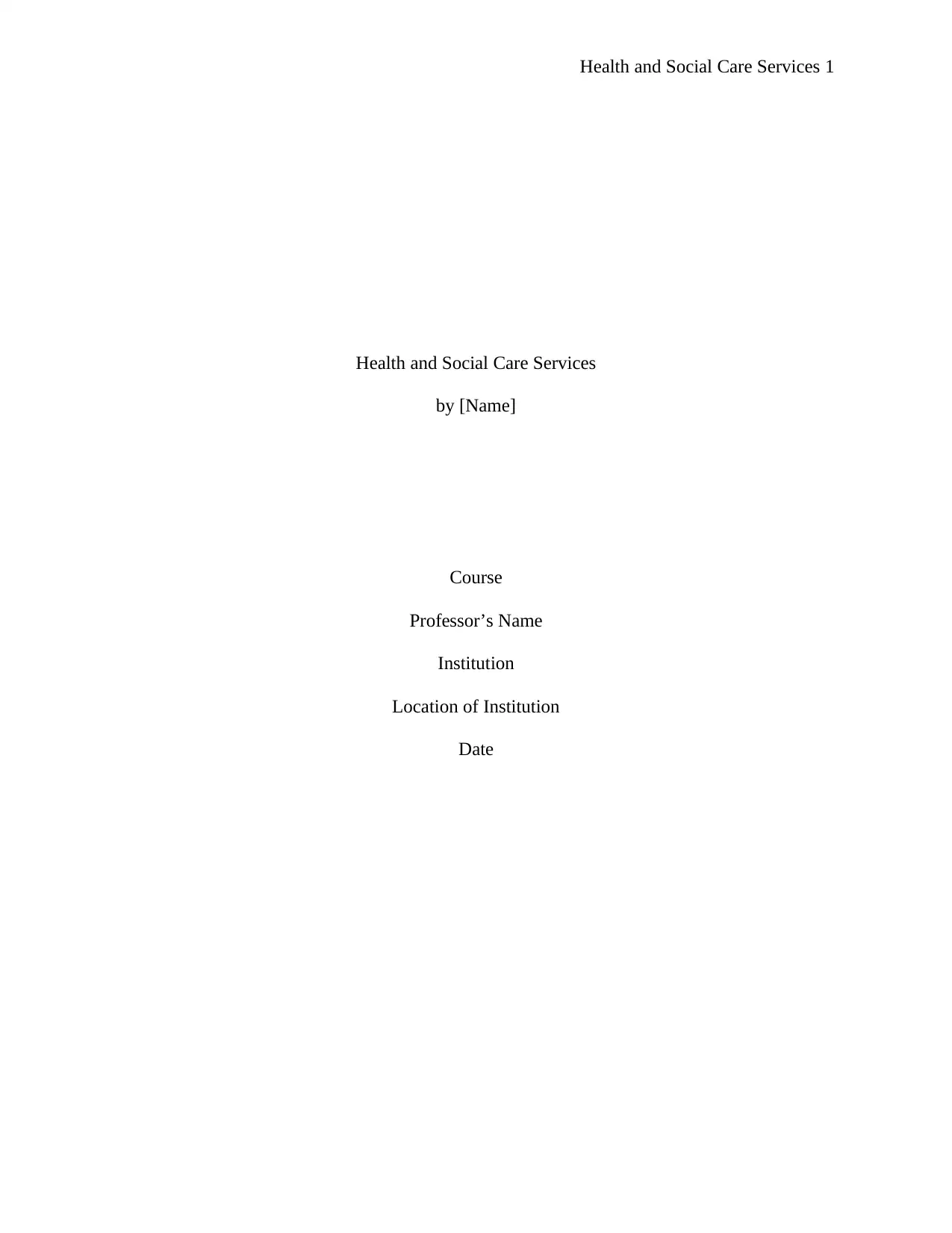
Health and Social Care Services 1
Health and Social Care Services
by [Name]
Course
Professor’s Name
Institution
Location of Institution
Date
Health and Social Care Services
by [Name]
Course
Professor’s Name
Institution
Location of Institution
Date
Secure Best Marks with AI Grader
Need help grading? Try our AI Grader for instant feedback on your assignments.
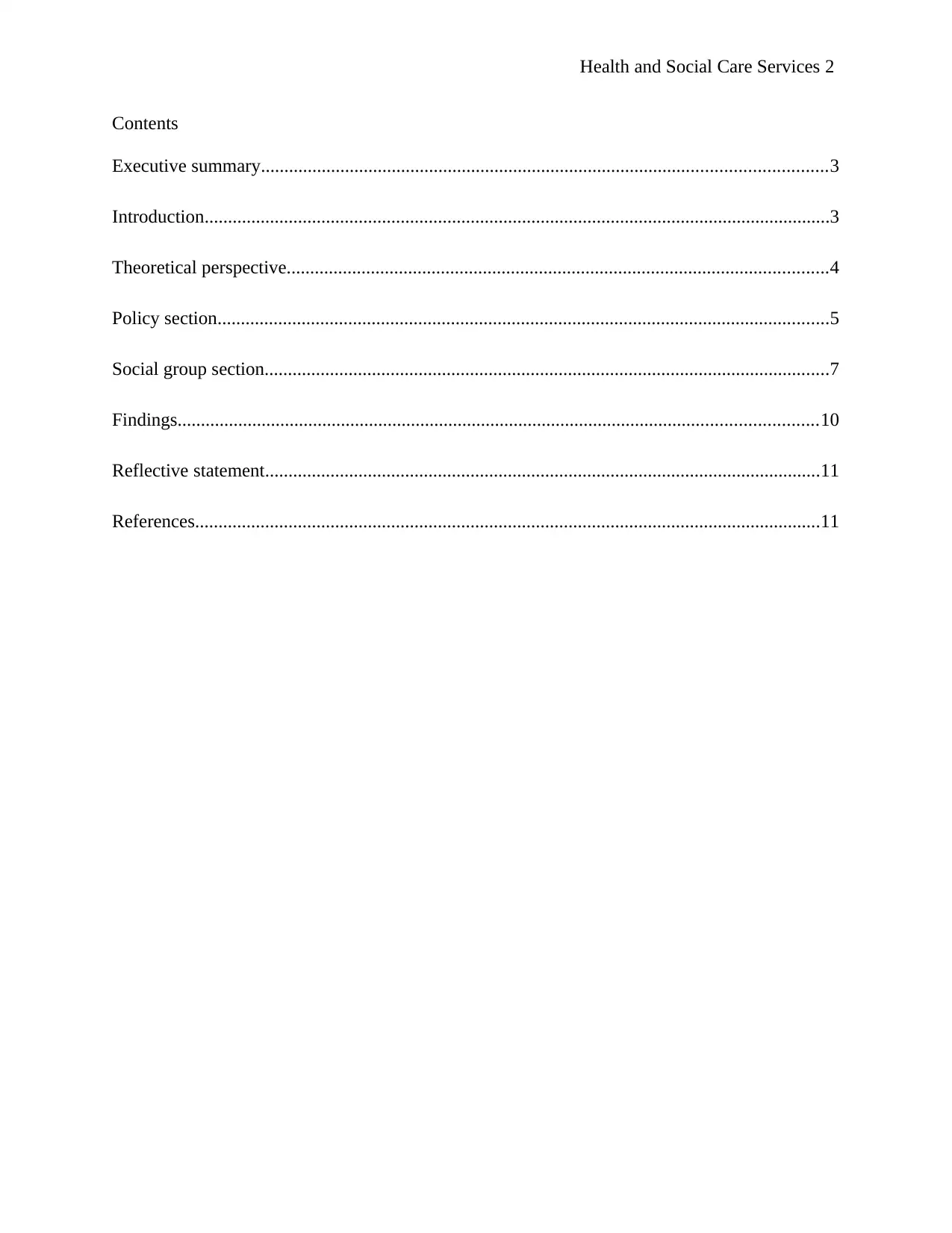
Health and Social Care Services 2
Contents
Executive summary.........................................................................................................................3
Introduction......................................................................................................................................3
Theoretical perspective....................................................................................................................4
Policy section...................................................................................................................................5
Social group section.........................................................................................................................7
Findings.........................................................................................................................................10
Reflective statement.......................................................................................................................11
References......................................................................................................................................11
Contents
Executive summary.........................................................................................................................3
Introduction......................................................................................................................................3
Theoretical perspective....................................................................................................................4
Policy section...................................................................................................................................5
Social group section.........................................................................................................................7
Findings.........................................................................................................................................10
Reflective statement.......................................................................................................................11
References......................................................................................................................................11
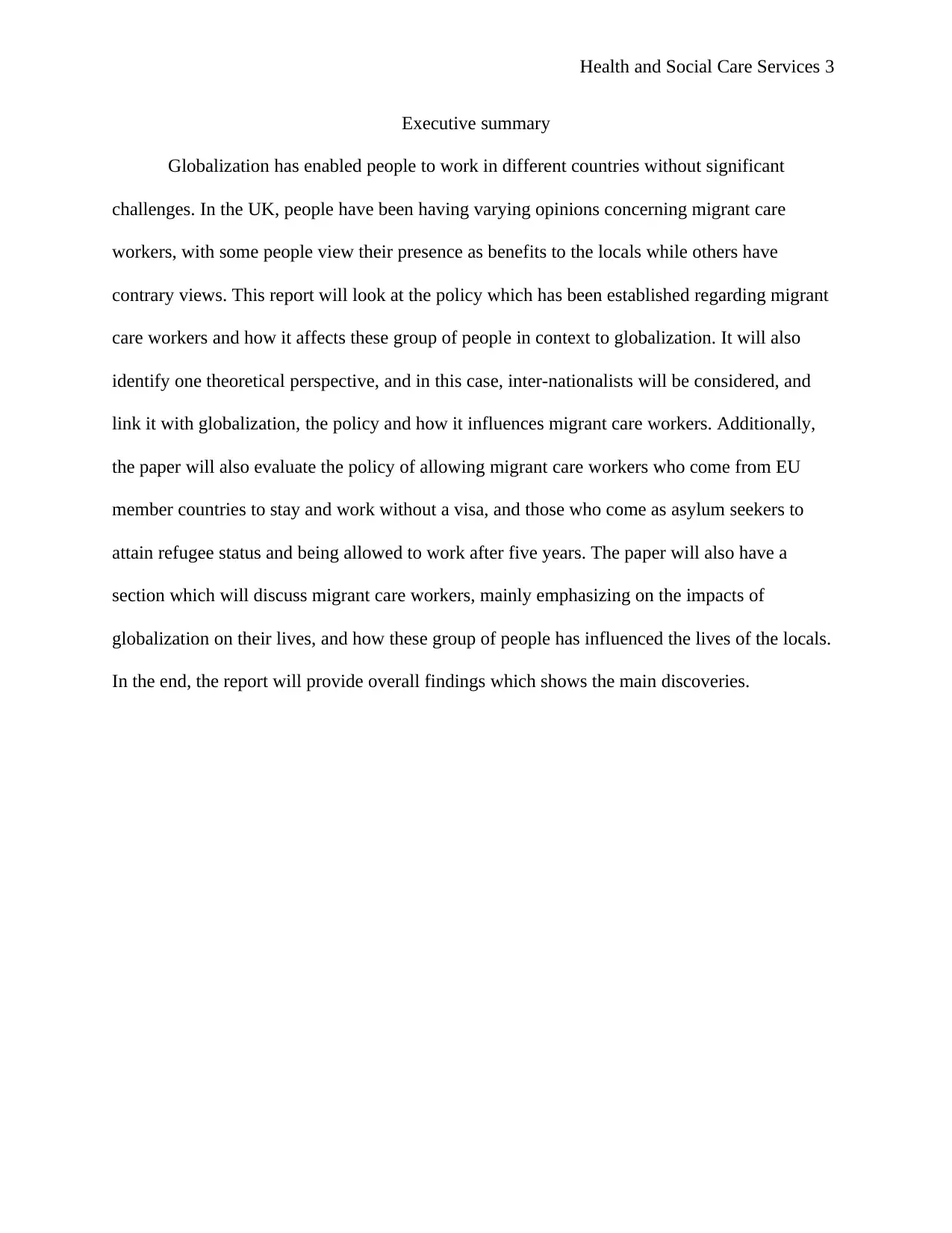
Health and Social Care Services 3
Executive summary
Globalization has enabled people to work in different countries without significant
challenges. In the UK, people have been having varying opinions concerning migrant care
workers, with some people view their presence as benefits to the locals while others have
contrary views. This report will look at the policy which has been established regarding migrant
care workers and how it affects these group of people in context to globalization. It will also
identify one theoretical perspective, and in this case, inter-nationalists will be considered, and
link it with globalization, the policy and how it influences migrant care workers. Additionally,
the paper will also evaluate the policy of allowing migrant care workers who come from EU
member countries to stay and work without a visa, and those who come as asylum seekers to
attain refugee status and being allowed to work after five years. The paper will also have a
section which will discuss migrant care workers, mainly emphasizing on the impacts of
globalization on their lives, and how these group of people has influenced the lives of the locals.
In the end, the report will provide overall findings which shows the main discoveries.
Executive summary
Globalization has enabled people to work in different countries without significant
challenges. In the UK, people have been having varying opinions concerning migrant care
workers, with some people view their presence as benefits to the locals while others have
contrary views. This report will look at the policy which has been established regarding migrant
care workers and how it affects these group of people in context to globalization. It will also
identify one theoretical perspective, and in this case, inter-nationalists will be considered, and
link it with globalization, the policy and how it influences migrant care workers. Additionally,
the paper will also evaluate the policy of allowing migrant care workers who come from EU
member countries to stay and work without a visa, and those who come as asylum seekers to
attain refugee status and being allowed to work after five years. The paper will also have a
section which will discuss migrant care workers, mainly emphasizing on the impacts of
globalization on their lives, and how these group of people has influenced the lives of the locals.
In the end, the report will provide overall findings which shows the main discoveries.
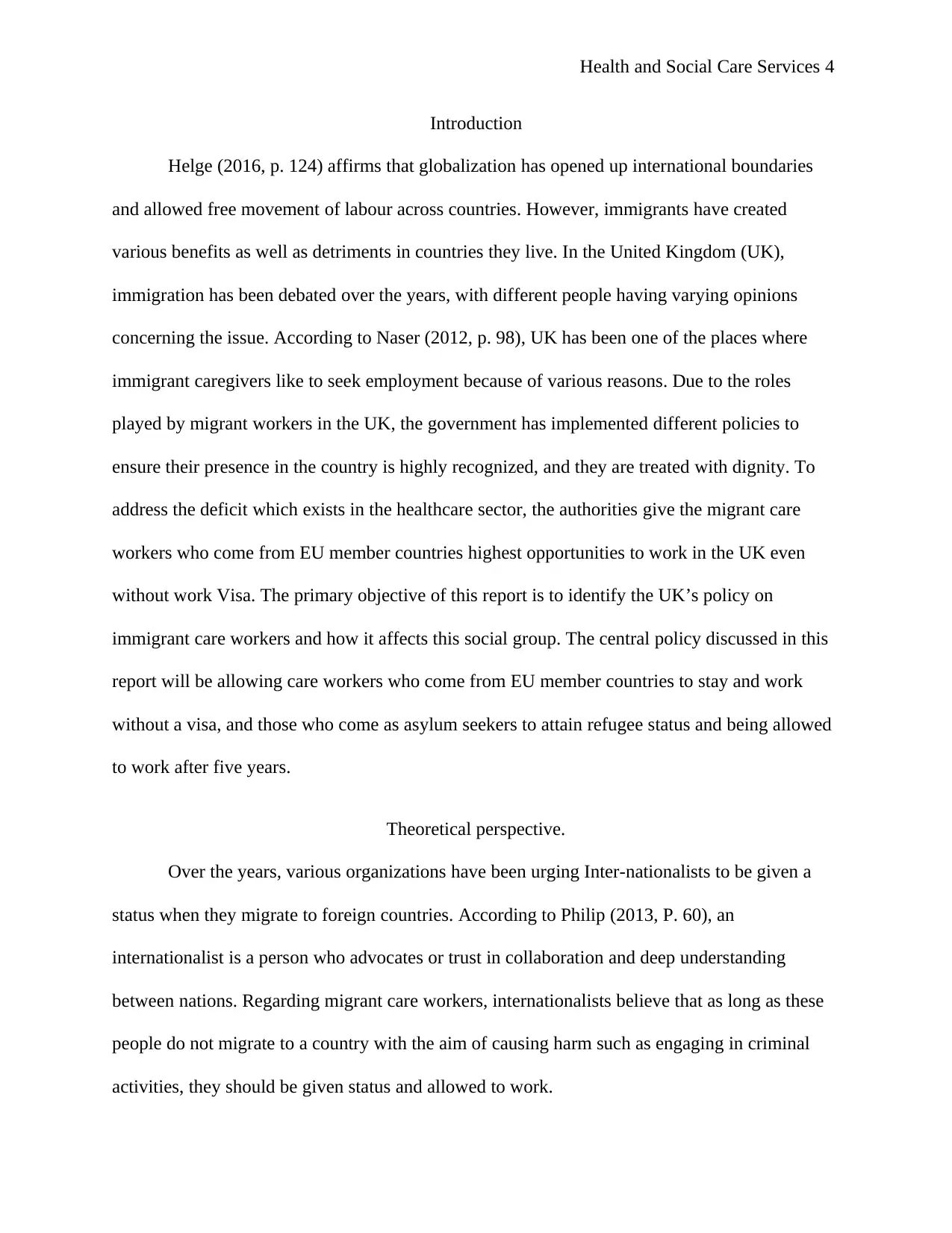
Health and Social Care Services 4
Introduction
Helge (2016, p. 124) affirms that globalization has opened up international boundaries
and allowed free movement of labour across countries. However, immigrants have created
various benefits as well as detriments in countries they live. In the United Kingdom (UK),
immigration has been debated over the years, with different people having varying opinions
concerning the issue. According to Naser (2012, p. 98), UK has been one of the places where
immigrant caregivers like to seek employment because of various reasons. Due to the roles
played by migrant workers in the UK, the government has implemented different policies to
ensure their presence in the country is highly recognized, and they are treated with dignity. To
address the deficit which exists in the healthcare sector, the authorities give the migrant care
workers who come from EU member countries highest opportunities to work in the UK even
without work Visa. The primary objective of this report is to identify the UK’s policy on
immigrant care workers and how it affects this social group. The central policy discussed in this
report will be allowing care workers who come from EU member countries to stay and work
without a visa, and those who come as asylum seekers to attain refugee status and being allowed
to work after five years.
Theoretical perspective.
Over the years, various organizations have been urging Inter-nationalists to be given a
status when they migrate to foreign countries. According to Philip (2013, P. 60), an
internationalist is a person who advocates or trust in collaboration and deep understanding
between nations. Regarding migrant care workers, internationalists believe that as long as these
people do not migrate to a country with the aim of causing harm such as engaging in criminal
activities, they should be given status and allowed to work.
Introduction
Helge (2016, p. 124) affirms that globalization has opened up international boundaries
and allowed free movement of labour across countries. However, immigrants have created
various benefits as well as detriments in countries they live. In the United Kingdom (UK),
immigration has been debated over the years, with different people having varying opinions
concerning the issue. According to Naser (2012, p. 98), UK has been one of the places where
immigrant caregivers like to seek employment because of various reasons. Due to the roles
played by migrant workers in the UK, the government has implemented different policies to
ensure their presence in the country is highly recognized, and they are treated with dignity. To
address the deficit which exists in the healthcare sector, the authorities give the migrant care
workers who come from EU member countries highest opportunities to work in the UK even
without work Visa. The primary objective of this report is to identify the UK’s policy on
immigrant care workers and how it affects this social group. The central policy discussed in this
report will be allowing care workers who come from EU member countries to stay and work
without a visa, and those who come as asylum seekers to attain refugee status and being allowed
to work after five years.
Theoretical perspective.
Over the years, various organizations have been urging Inter-nationalists to be given a
status when they migrate to foreign countries. According to Philip (2013, P. 60), an
internationalist is a person who advocates or trust in collaboration and deep understanding
between nations. Regarding migrant care workers, internationalists believe that as long as these
people do not migrate to a country with the aim of causing harm such as engaging in criminal
activities, they should be given status and allowed to work.
Secure Best Marks with AI Grader
Need help grading? Try our AI Grader for instant feedback on your assignments.
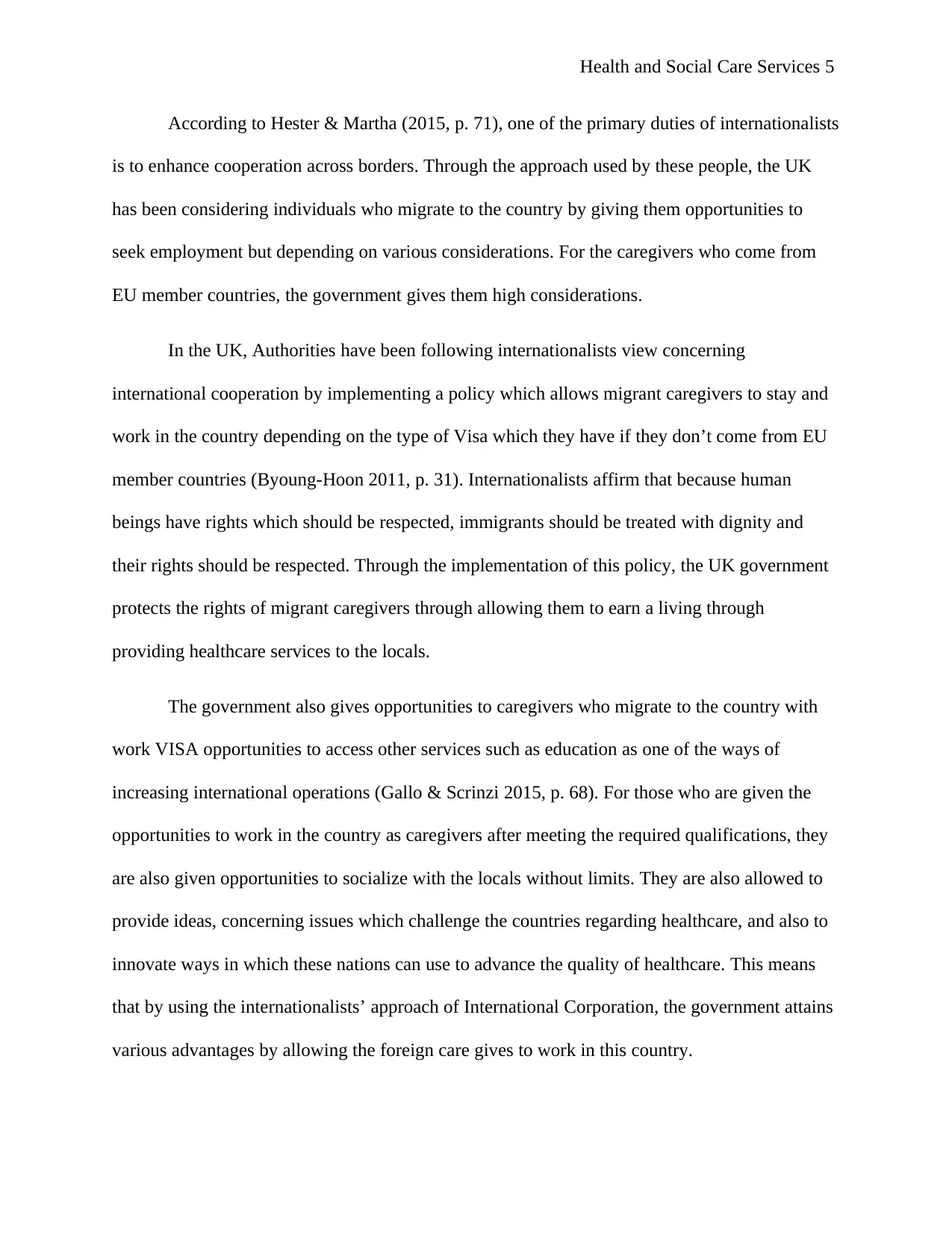
Health and Social Care Services 5
According to Hester & Martha (2015, p. 71), one of the primary duties of internationalists
is to enhance cooperation across borders. Through the approach used by these people, the UK
has been considering individuals who migrate to the country by giving them opportunities to
seek employment but depending on various considerations. For the caregivers who come from
EU member countries, the government gives them high considerations.
In the UK, Authorities have been following internationalists view concerning
international cooperation by implementing a policy which allows migrant caregivers to stay and
work in the country depending on the type of Visa which they have if they don’t come from EU
member countries (Byoung-Hoon 2011, p. 31). Internationalists affirm that because human
beings have rights which should be respected, immigrants should be treated with dignity and
their rights should be respected. Through the implementation of this policy, the UK government
protects the rights of migrant caregivers through allowing them to earn a living through
providing healthcare services to the locals.
The government also gives opportunities to caregivers who migrate to the country with
work VISA opportunities to access other services such as education as one of the ways of
increasing international operations (Gallo & Scrinzi 2015, p. 68). For those who are given the
opportunities to work in the country as caregivers after meeting the required qualifications, they
are also given opportunities to socialize with the locals without limits. They are also allowed to
provide ideas, concerning issues which challenge the countries regarding healthcare, and also to
innovate ways in which these nations can use to advance the quality of healthcare. This means
that by using the internationalists’ approach of International Corporation, the government attains
various advantages by allowing the foreign care gives to work in this country.
According to Hester & Martha (2015, p. 71), one of the primary duties of internationalists
is to enhance cooperation across borders. Through the approach used by these people, the UK
has been considering individuals who migrate to the country by giving them opportunities to
seek employment but depending on various considerations. For the caregivers who come from
EU member countries, the government gives them high considerations.
In the UK, Authorities have been following internationalists view concerning
international cooperation by implementing a policy which allows migrant caregivers to stay and
work in the country depending on the type of Visa which they have if they don’t come from EU
member countries (Byoung-Hoon 2011, p. 31). Internationalists affirm that because human
beings have rights which should be respected, immigrants should be treated with dignity and
their rights should be respected. Through the implementation of this policy, the UK government
protects the rights of migrant caregivers through allowing them to earn a living through
providing healthcare services to the locals.
The government also gives opportunities to caregivers who migrate to the country with
work VISA opportunities to access other services such as education as one of the ways of
increasing international operations (Gallo & Scrinzi 2015, p. 68). For those who are given the
opportunities to work in the country as caregivers after meeting the required qualifications, they
are also given opportunities to socialize with the locals without limits. They are also allowed to
provide ideas, concerning issues which challenge the countries regarding healthcare, and also to
innovate ways in which these nations can use to advance the quality of healthcare. This means
that by using the internationalists’ approach of International Corporation, the government attains
various advantages by allowing the foreign care gives to work in this country.
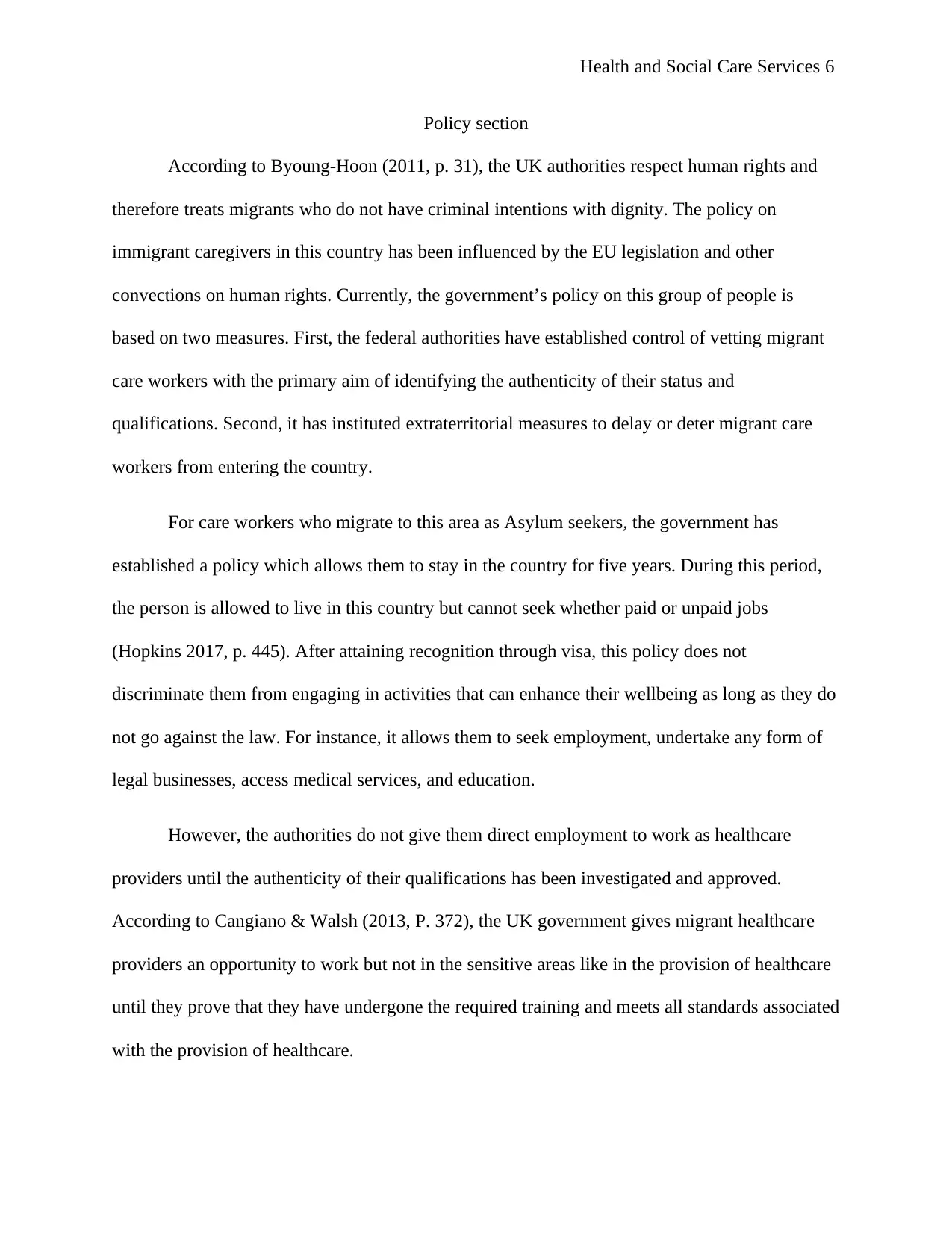
Health and Social Care Services 6
Policy section
According to Byoung-Hoon (2011, p. 31), the UK authorities respect human rights and
therefore treats migrants who do not have criminal intentions with dignity. The policy on
immigrant caregivers in this country has been influenced by the EU legislation and other
convections on human rights. Currently, the government’s policy on this group of people is
based on two measures. First, the federal authorities have established control of vetting migrant
care workers with the primary aim of identifying the authenticity of their status and
qualifications. Second, it has instituted extraterritorial measures to delay or deter migrant care
workers from entering the country.
For care workers who migrate to this area as Asylum seekers, the government has
established a policy which allows them to stay in the country for five years. During this period,
the person is allowed to live in this country but cannot seek whether paid or unpaid jobs
(Hopkins 2017, p. 445). After attaining recognition through visa, this policy does not
discriminate them from engaging in activities that can enhance their wellbeing as long as they do
not go against the law. For instance, it allows them to seek employment, undertake any form of
legal businesses, access medical services, and education.
However, the authorities do not give them direct employment to work as healthcare
providers until the authenticity of their qualifications has been investigated and approved.
According to Cangiano & Walsh (2013, P. 372), the UK government gives migrant healthcare
providers an opportunity to work but not in the sensitive areas like in the provision of healthcare
until they prove that they have undergone the required training and meets all standards associated
with the provision of healthcare.
Policy section
According to Byoung-Hoon (2011, p. 31), the UK authorities respect human rights and
therefore treats migrants who do not have criminal intentions with dignity. The policy on
immigrant caregivers in this country has been influenced by the EU legislation and other
convections on human rights. Currently, the government’s policy on this group of people is
based on two measures. First, the federal authorities have established control of vetting migrant
care workers with the primary aim of identifying the authenticity of their status and
qualifications. Second, it has instituted extraterritorial measures to delay or deter migrant care
workers from entering the country.
For care workers who migrate to this area as Asylum seekers, the government has
established a policy which allows them to stay in the country for five years. During this period,
the person is allowed to live in this country but cannot seek whether paid or unpaid jobs
(Hopkins 2017, p. 445). After attaining recognition through visa, this policy does not
discriminate them from engaging in activities that can enhance their wellbeing as long as they do
not go against the law. For instance, it allows them to seek employment, undertake any form of
legal businesses, access medical services, and education.
However, the authorities do not give them direct employment to work as healthcare
providers until the authenticity of their qualifications has been investigated and approved.
According to Cangiano & Walsh (2013, P. 372), the UK government gives migrant healthcare
providers an opportunity to work but not in the sensitive areas like in the provision of healthcare
until they prove that they have undergone the required training and meets all standards associated
with the provision of healthcare.
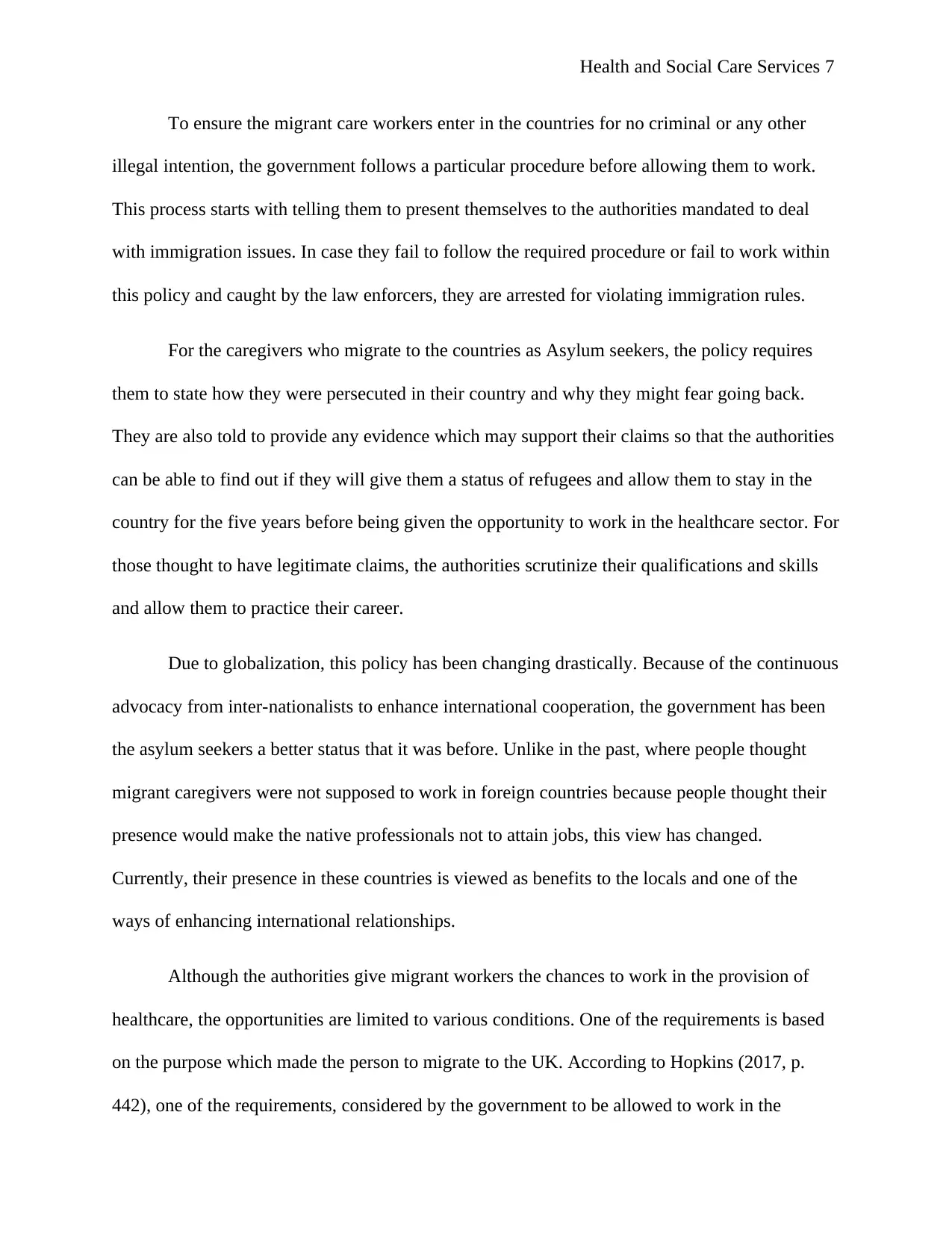
Health and Social Care Services 7
To ensure the migrant care workers enter in the countries for no criminal or any other
illegal intention, the government follows a particular procedure before allowing them to work.
This process starts with telling them to present themselves to the authorities mandated to deal
with immigration issues. In case they fail to follow the required procedure or fail to work within
this policy and caught by the law enforcers, they are arrested for violating immigration rules.
For the caregivers who migrate to the countries as Asylum seekers, the policy requires
them to state how they were persecuted in their country and why they might fear going back.
They are also told to provide any evidence which may support their claims so that the authorities
can be able to find out if they will give them a status of refugees and allow them to stay in the
country for the five years before being given the opportunity to work in the healthcare sector. For
those thought to have legitimate claims, the authorities scrutinize their qualifications and skills
and allow them to practice their career.
Due to globalization, this policy has been changing drastically. Because of the continuous
advocacy from inter-nationalists to enhance international cooperation, the government has been
the asylum seekers a better status that it was before. Unlike in the past, where people thought
migrant caregivers were not supposed to work in foreign countries because people thought their
presence would make the native professionals not to attain jobs, this view has changed.
Currently, their presence in these countries is viewed as benefits to the locals and one of the
ways of enhancing international relationships.
Although the authorities give migrant workers the chances to work in the provision of
healthcare, the opportunities are limited to various conditions. One of the requirements is based
on the purpose which made the person to migrate to the UK. According to Hopkins (2017, p.
442), one of the requirements, considered by the government to be allowed to work in the
To ensure the migrant care workers enter in the countries for no criminal or any other
illegal intention, the government follows a particular procedure before allowing them to work.
This process starts with telling them to present themselves to the authorities mandated to deal
with immigration issues. In case they fail to follow the required procedure or fail to work within
this policy and caught by the law enforcers, they are arrested for violating immigration rules.
For the caregivers who migrate to the countries as Asylum seekers, the policy requires
them to state how they were persecuted in their country and why they might fear going back.
They are also told to provide any evidence which may support their claims so that the authorities
can be able to find out if they will give them a status of refugees and allow them to stay in the
country for the five years before being given the opportunity to work in the healthcare sector. For
those thought to have legitimate claims, the authorities scrutinize their qualifications and skills
and allow them to practice their career.
Due to globalization, this policy has been changing drastically. Because of the continuous
advocacy from inter-nationalists to enhance international cooperation, the government has been
the asylum seekers a better status that it was before. Unlike in the past, where people thought
migrant caregivers were not supposed to work in foreign countries because people thought their
presence would make the native professionals not to attain jobs, this view has changed.
Currently, their presence in these countries is viewed as benefits to the locals and one of the
ways of enhancing international relationships.
Although the authorities give migrant workers the chances to work in the provision of
healthcare, the opportunities are limited to various conditions. One of the requirements is based
on the purpose which made the person to migrate to the UK. According to Hopkins (2017, p.
442), one of the requirements, considered by the government to be allowed to work in the
Paraphrase This Document
Need a fresh take? Get an instant paraphrase of this document with our AI Paraphraser
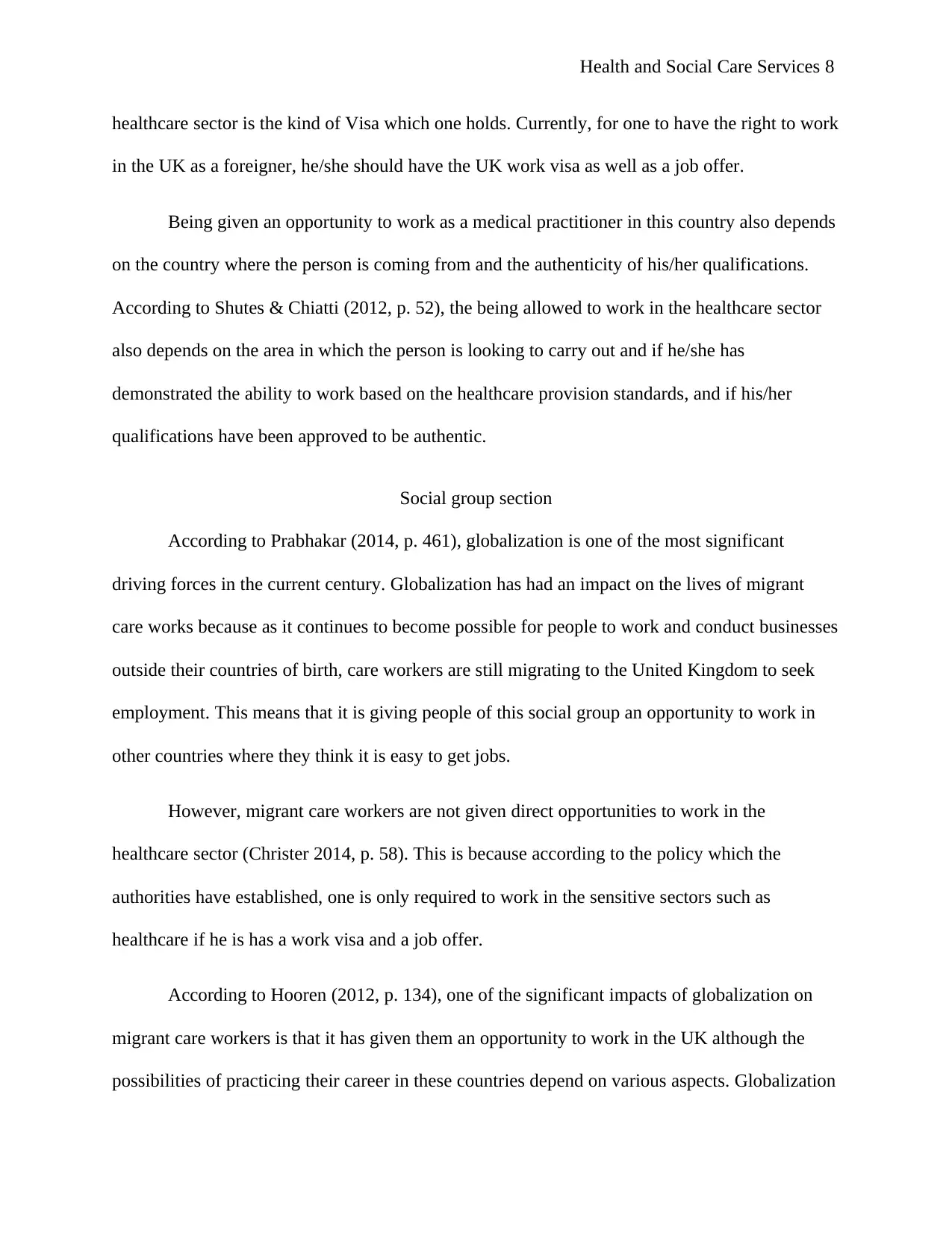
Health and Social Care Services 8
healthcare sector is the kind of Visa which one holds. Currently, for one to have the right to work
in the UK as a foreigner, he/she should have the UK work visa as well as a job offer.
Being given an opportunity to work as a medical practitioner in this country also depends
on the country where the person is coming from and the authenticity of his/her qualifications.
According to Shutes & Chiatti (2012, p. 52), the being allowed to work in the healthcare sector
also depends on the area in which the person is looking to carry out and if he/she has
demonstrated the ability to work based on the healthcare provision standards, and if his/her
qualifications have been approved to be authentic.
Social group section
According to Prabhakar (2014, p. 461), globalization is one of the most significant
driving forces in the current century. Globalization has had an impact on the lives of migrant
care works because as it continues to become possible for people to work and conduct businesses
outside their countries of birth, care workers are still migrating to the United Kingdom to seek
employment. This means that it is giving people of this social group an opportunity to work in
other countries where they think it is easy to get jobs.
However, migrant care workers are not given direct opportunities to work in the
healthcare sector (Christer 2014, p. 58). This is because according to the policy which the
authorities have established, one is only required to work in the sensitive sectors such as
healthcare if he is has a work visa and a job offer.
According to Hooren (2012, p. 134), one of the significant impacts of globalization on
migrant care workers is that it has given them an opportunity to work in the UK although the
possibilities of practicing their career in these countries depend on various aspects. Globalization
healthcare sector is the kind of Visa which one holds. Currently, for one to have the right to work
in the UK as a foreigner, he/she should have the UK work visa as well as a job offer.
Being given an opportunity to work as a medical practitioner in this country also depends
on the country where the person is coming from and the authenticity of his/her qualifications.
According to Shutes & Chiatti (2012, p. 52), the being allowed to work in the healthcare sector
also depends on the area in which the person is looking to carry out and if he/she has
demonstrated the ability to work based on the healthcare provision standards, and if his/her
qualifications have been approved to be authentic.
Social group section
According to Prabhakar (2014, p. 461), globalization is one of the most significant
driving forces in the current century. Globalization has had an impact on the lives of migrant
care works because as it continues to become possible for people to work and conduct businesses
outside their countries of birth, care workers are still migrating to the United Kingdom to seek
employment. This means that it is giving people of this social group an opportunity to work in
other countries where they think it is easy to get jobs.
However, migrant care workers are not given direct opportunities to work in the
healthcare sector (Christer 2014, p. 58). This is because according to the policy which the
authorities have established, one is only required to work in the sensitive sectors such as
healthcare if he is has a work visa and a job offer.
According to Hooren (2012, p. 134), one of the significant impacts of globalization on
migrant care workers is that it has given them an opportunity to work in the UK although the
possibilities of practicing their career in these countries depend on various aspects. Globalization
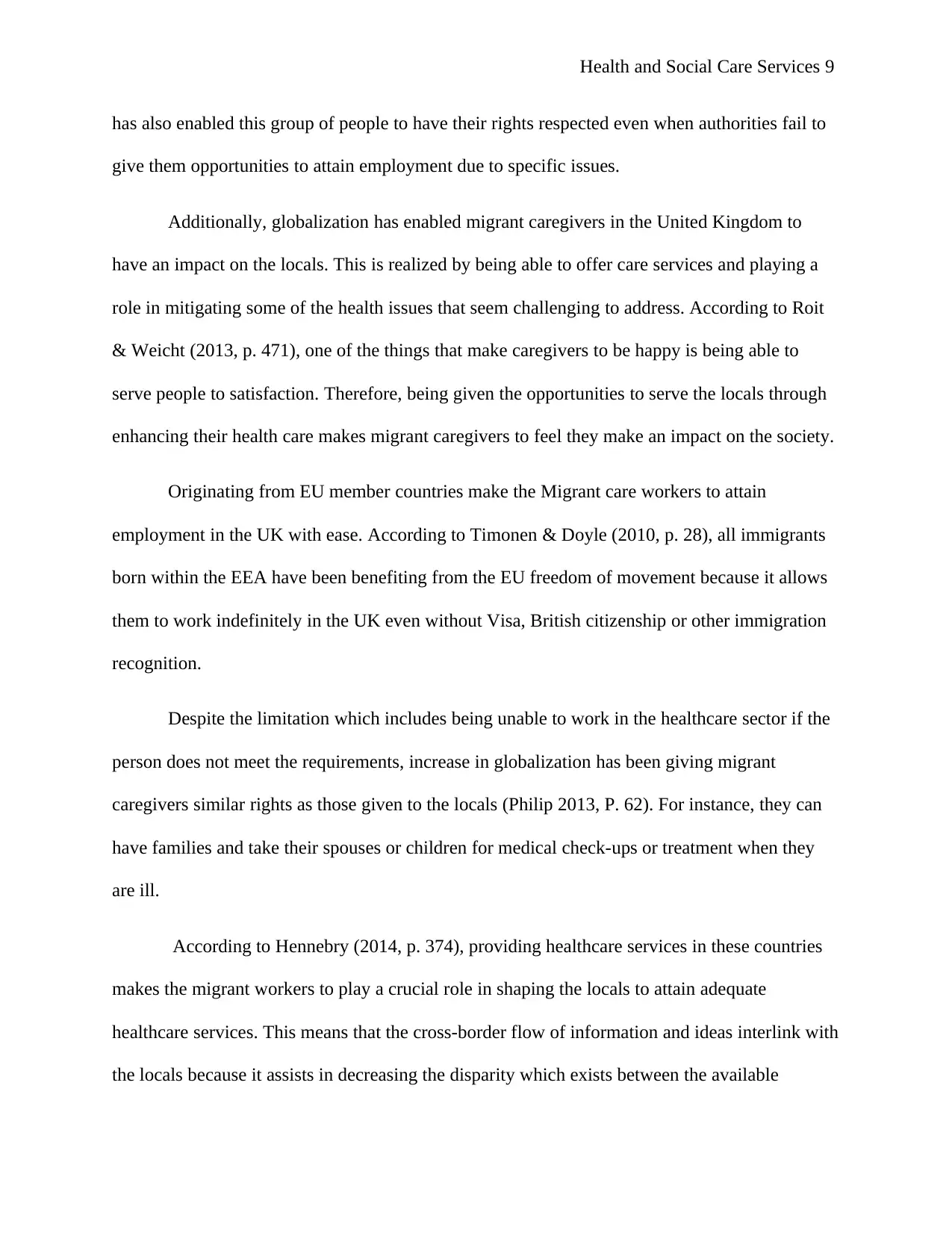
Health and Social Care Services 9
has also enabled this group of people to have their rights respected even when authorities fail to
give them opportunities to attain employment due to specific issues.
Additionally, globalization has enabled migrant caregivers in the United Kingdom to
have an impact on the locals. This is realized by being able to offer care services and playing a
role in mitigating some of the health issues that seem challenging to address. According to Roit
& Weicht (2013, p. 471), one of the things that make caregivers to be happy is being able to
serve people to satisfaction. Therefore, being given the opportunities to serve the locals through
enhancing their health care makes migrant caregivers to feel they make an impact on the society.
Originating from EU member countries make the Migrant care workers to attain
employment in the UK with ease. According to Timonen & Doyle (2010, p. 28), all immigrants
born within the EEA have been benefiting from the EU freedom of movement because it allows
them to work indefinitely in the UK even without Visa, British citizenship or other immigration
recognition.
Despite the limitation which includes being unable to work in the healthcare sector if the
person does not meet the requirements, increase in globalization has been giving migrant
caregivers similar rights as those given to the locals (Philip 2013, P. 62). For instance, they can
have families and take their spouses or children for medical check-ups or treatment when they
are ill.
According to Hennebry (2014, p. 374), providing healthcare services in these countries
makes the migrant workers to play a crucial role in shaping the locals to attain adequate
healthcare services. This means that the cross-border flow of information and ideas interlink with
the locals because it assists in decreasing the disparity which exists between the available
has also enabled this group of people to have their rights respected even when authorities fail to
give them opportunities to attain employment due to specific issues.
Additionally, globalization has enabled migrant caregivers in the United Kingdom to
have an impact on the locals. This is realized by being able to offer care services and playing a
role in mitigating some of the health issues that seem challenging to address. According to Roit
& Weicht (2013, p. 471), one of the things that make caregivers to be happy is being able to
serve people to satisfaction. Therefore, being given the opportunities to serve the locals through
enhancing their health care makes migrant caregivers to feel they make an impact on the society.
Originating from EU member countries make the Migrant care workers to attain
employment in the UK with ease. According to Timonen & Doyle (2010, p. 28), all immigrants
born within the EEA have been benefiting from the EU freedom of movement because it allows
them to work indefinitely in the UK even without Visa, British citizenship or other immigration
recognition.
Despite the limitation which includes being unable to work in the healthcare sector if the
person does not meet the requirements, increase in globalization has been giving migrant
caregivers similar rights as those given to the locals (Philip 2013, P. 62). For instance, they can
have families and take their spouses or children for medical check-ups or treatment when they
are ill.
According to Hennebry (2014, p. 374), providing healthcare services in these countries
makes the migrant workers to play a crucial role in shaping the locals to attain adequate
healthcare services. This means that the cross-border flow of information and ideas interlink with
the locals because it assists in decreasing the disparity which exists between the available
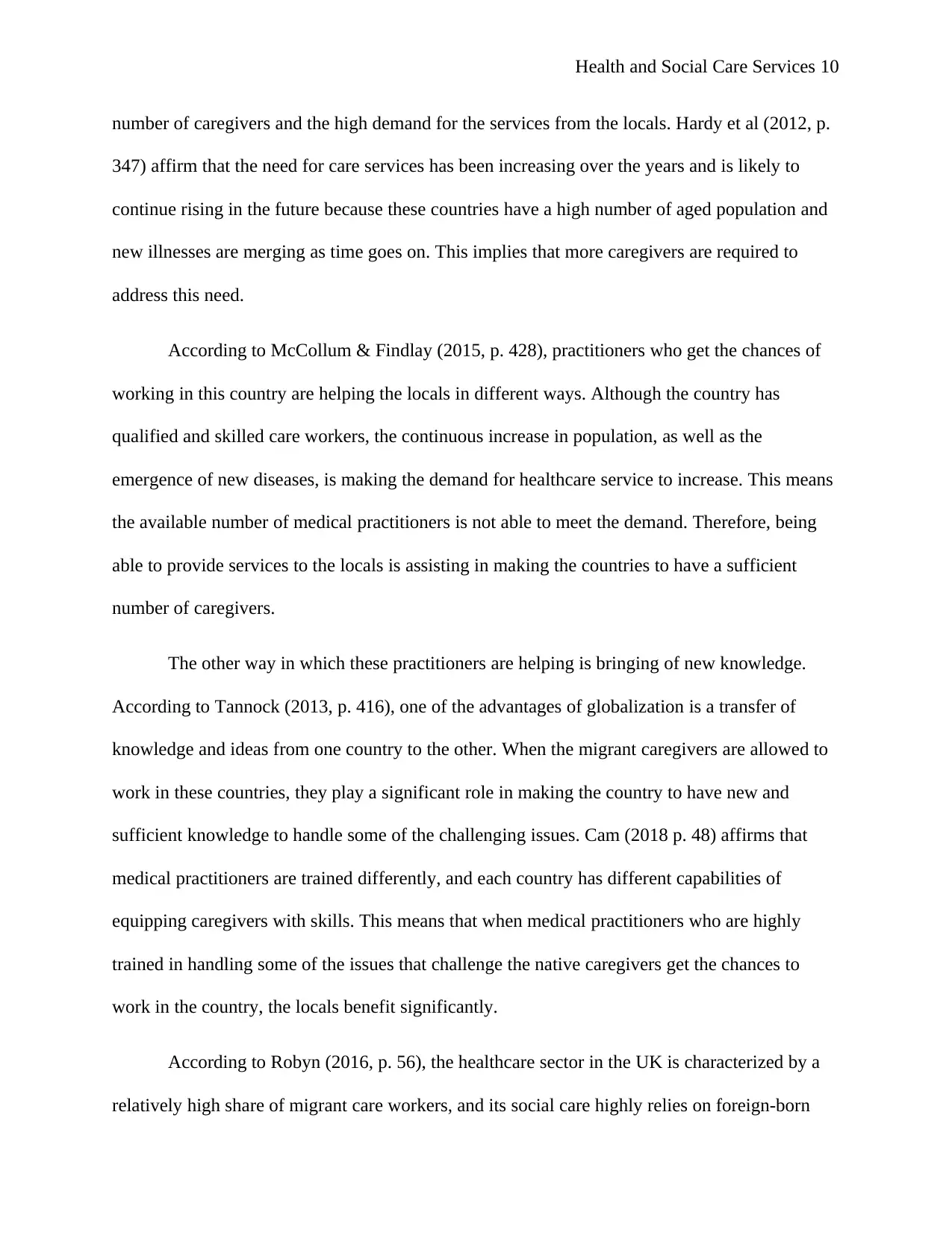
Health and Social Care Services 10
number of caregivers and the high demand for the services from the locals. Hardy et al (2012, p.
347) affirm that the need for care services has been increasing over the years and is likely to
continue rising in the future because these countries have a high number of aged population and
new illnesses are merging as time goes on. This implies that more caregivers are required to
address this need.
According to McCollum & Findlay (2015, p. 428), practitioners who get the chances of
working in this country are helping the locals in different ways. Although the country has
qualified and skilled care workers, the continuous increase in population, as well as the
emergence of new diseases, is making the demand for healthcare service to increase. This means
the available number of medical practitioners is not able to meet the demand. Therefore, being
able to provide services to the locals is assisting in making the countries to have a sufficient
number of caregivers.
The other way in which these practitioners are helping is bringing of new knowledge.
According to Tannock (2013, p. 416), one of the advantages of globalization is a transfer of
knowledge and ideas from one country to the other. When the migrant caregivers are allowed to
work in these countries, they play a significant role in making the country to have new and
sufficient knowledge to handle some of the challenging issues. Cam (2018 p. 48) affirms that
medical practitioners are trained differently, and each country has different capabilities of
equipping caregivers with skills. This means that when medical practitioners who are highly
trained in handling some of the issues that challenge the native caregivers get the chances to
work in the country, the locals benefit significantly.
According to Robyn (2016, p. 56), the healthcare sector in the UK is characterized by a
relatively high share of migrant care workers, and its social care highly relies on foreign-born
number of caregivers and the high demand for the services from the locals. Hardy et al (2012, p.
347) affirm that the need for care services has been increasing over the years and is likely to
continue rising in the future because these countries have a high number of aged population and
new illnesses are merging as time goes on. This implies that more caregivers are required to
address this need.
According to McCollum & Findlay (2015, p. 428), practitioners who get the chances of
working in this country are helping the locals in different ways. Although the country has
qualified and skilled care workers, the continuous increase in population, as well as the
emergence of new diseases, is making the demand for healthcare service to increase. This means
the available number of medical practitioners is not able to meet the demand. Therefore, being
able to provide services to the locals is assisting in making the countries to have a sufficient
number of caregivers.
The other way in which these practitioners are helping is bringing of new knowledge.
According to Tannock (2013, p. 416), one of the advantages of globalization is a transfer of
knowledge and ideas from one country to the other. When the migrant caregivers are allowed to
work in these countries, they play a significant role in making the country to have new and
sufficient knowledge to handle some of the challenging issues. Cam (2018 p. 48) affirms that
medical practitioners are trained differently, and each country has different capabilities of
equipping caregivers with skills. This means that when medical practitioners who are highly
trained in handling some of the issues that challenge the native caregivers get the chances to
work in the country, the locals benefit significantly.
According to Robyn (2016, p. 56), the healthcare sector in the UK is characterized by a
relatively high share of migrant care workers, and its social care highly relies on foreign-born
Secure Best Marks with AI Grader
Need help grading? Try our AI Grader for instant feedback on your assignments.
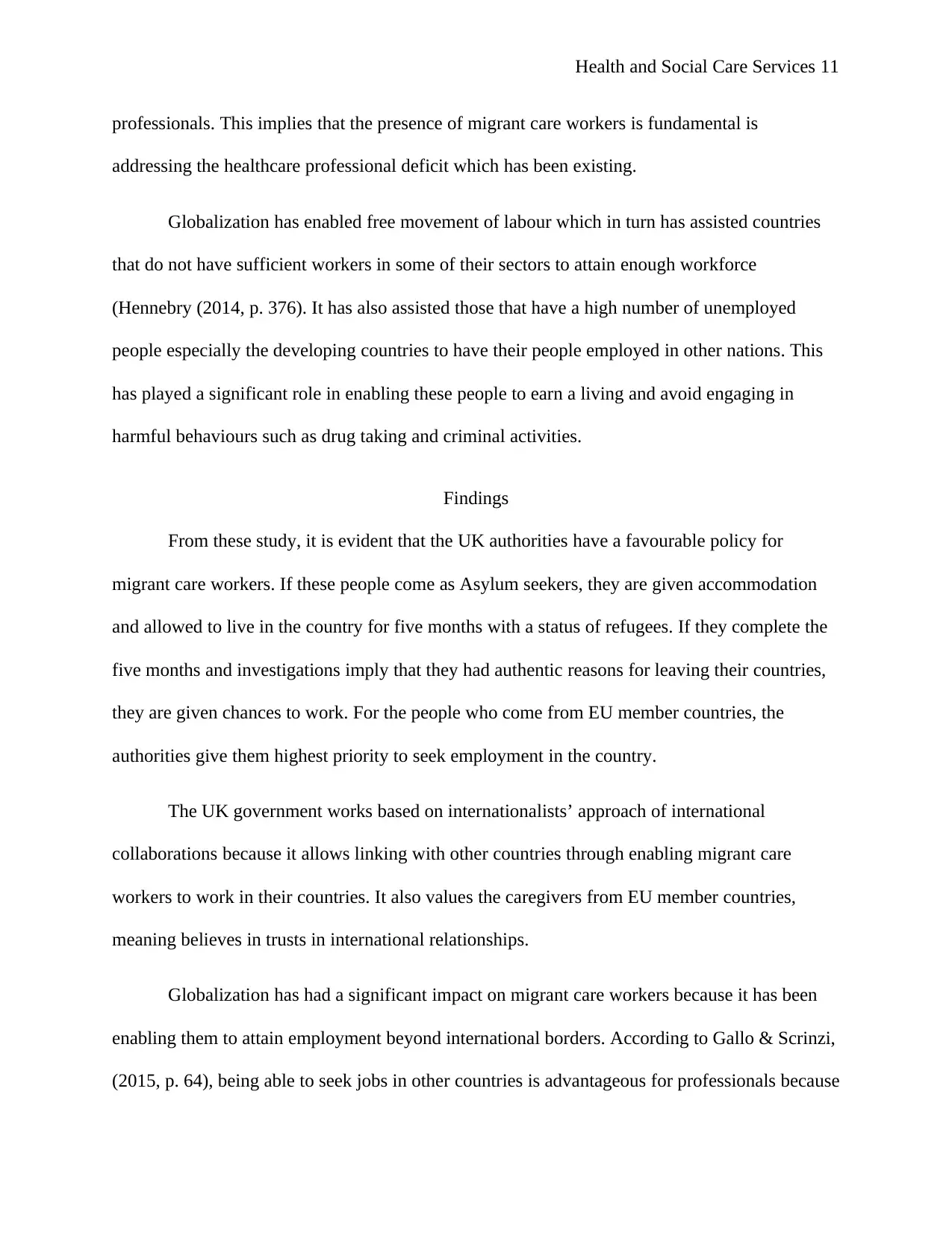
Health and Social Care Services 11
professionals. This implies that the presence of migrant care workers is fundamental is
addressing the healthcare professional deficit which has been existing.
Globalization has enabled free movement of labour which in turn has assisted countries
that do not have sufficient workers in some of their sectors to attain enough workforce
(Hennebry (2014, p. 376). It has also assisted those that have a high number of unemployed
people especially the developing countries to have their people employed in other nations. This
has played a significant role in enabling these people to earn a living and avoid engaging in
harmful behaviours such as drug taking and criminal activities.
Findings
From these study, it is evident that the UK authorities have a favourable policy for
migrant care workers. If these people come as Asylum seekers, they are given accommodation
and allowed to live in the country for five months with a status of refugees. If they complete the
five months and investigations imply that they had authentic reasons for leaving their countries,
they are given chances to work. For the people who come from EU member countries, the
authorities give them highest priority to seek employment in the country.
The UK government works based on internationalists’ approach of international
collaborations because it allows linking with other countries through enabling migrant care
workers to work in their countries. It also values the caregivers from EU member countries,
meaning believes in trusts in international relationships.
Globalization has had a significant impact on migrant care workers because it has been
enabling them to attain employment beyond international borders. According to Gallo & Scrinzi,
(2015, p. 64), being able to seek jobs in other countries is advantageous for professionals because
professionals. This implies that the presence of migrant care workers is fundamental is
addressing the healthcare professional deficit which has been existing.
Globalization has enabled free movement of labour which in turn has assisted countries
that do not have sufficient workers in some of their sectors to attain enough workforce
(Hennebry (2014, p. 376). It has also assisted those that have a high number of unemployed
people especially the developing countries to have their people employed in other nations. This
has played a significant role in enabling these people to earn a living and avoid engaging in
harmful behaviours such as drug taking and criminal activities.
Findings
From these study, it is evident that the UK authorities have a favourable policy for
migrant care workers. If these people come as Asylum seekers, they are given accommodation
and allowed to live in the country for five months with a status of refugees. If they complete the
five months and investigations imply that they had authentic reasons for leaving their countries,
they are given chances to work. For the people who come from EU member countries, the
authorities give them highest priority to seek employment in the country.
The UK government works based on internationalists’ approach of international
collaborations because it allows linking with other countries through enabling migrant care
workers to work in their countries. It also values the caregivers from EU member countries,
meaning believes in trusts in international relationships.
Globalization has had a significant impact on migrant care workers because it has been
enabling them to attain employment beyond international borders. According to Gallo & Scrinzi,
(2015, p. 64), being able to seek jobs in other countries is advantageous for professionals because
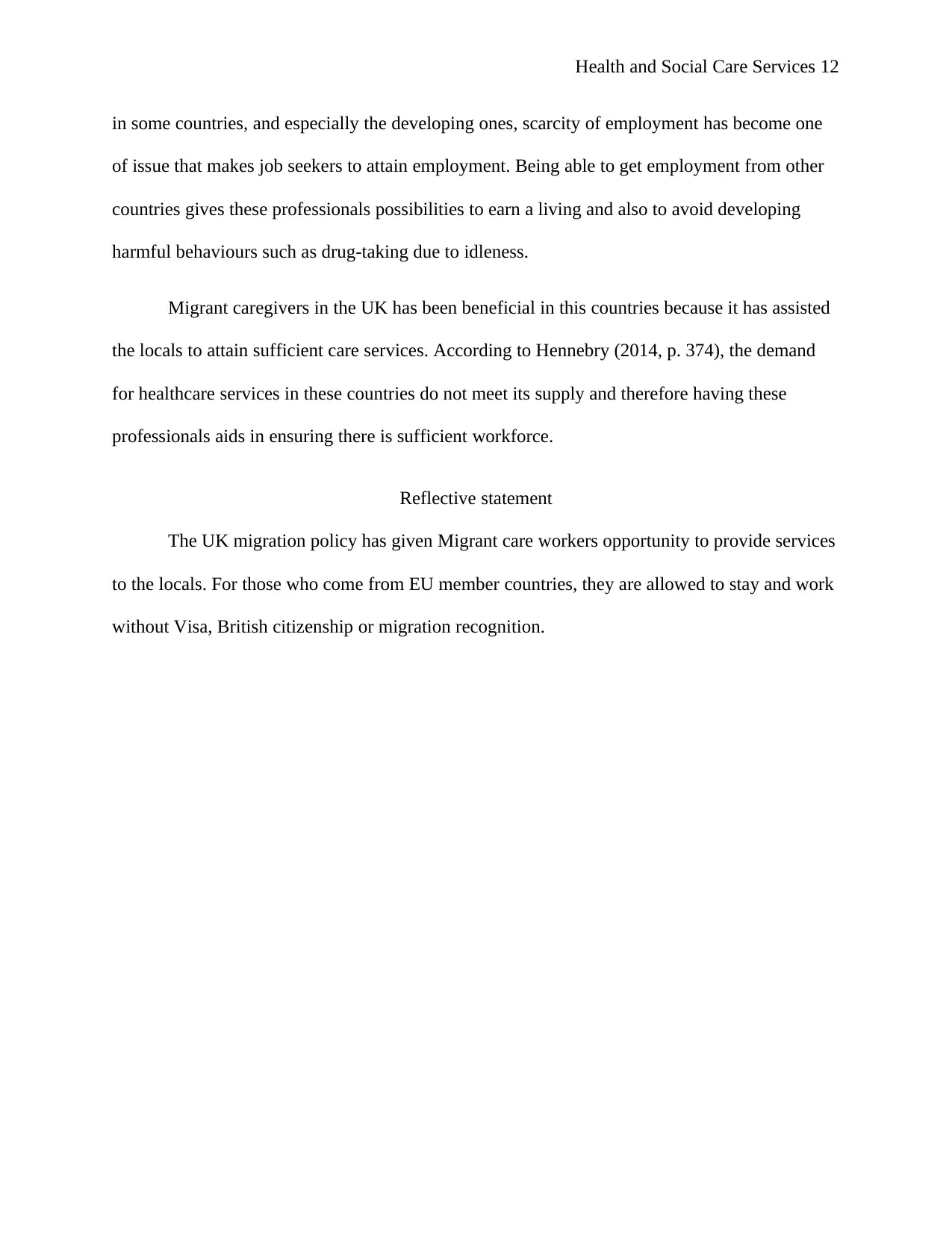
Health and Social Care Services 12
in some countries, and especially the developing ones, scarcity of employment has become one
of issue that makes job seekers to attain employment. Being able to get employment from other
countries gives these professionals possibilities to earn a living and also to avoid developing
harmful behaviours such as drug-taking due to idleness.
Migrant caregivers in the UK has been beneficial in this countries because it has assisted
the locals to attain sufficient care services. According to Hennebry (2014, p. 374), the demand
for healthcare services in these countries do not meet its supply and therefore having these
professionals aids in ensuring there is sufficient workforce.
Reflective statement
The UK migration policy has given Migrant care workers opportunity to provide services
to the locals. For those who come from EU member countries, they are allowed to stay and work
without Visa, British citizenship or migration recognition.
in some countries, and especially the developing ones, scarcity of employment has become one
of issue that makes job seekers to attain employment. Being able to get employment from other
countries gives these professionals possibilities to earn a living and also to avoid developing
harmful behaviours such as drug-taking due to idleness.
Migrant caregivers in the UK has been beneficial in this countries because it has assisted
the locals to attain sufficient care services. According to Hennebry (2014, p. 374), the demand
for healthcare services in these countries do not meet its supply and therefore having these
professionals aids in ensuring there is sufficient workforce.
Reflective statement
The UK migration policy has given Migrant care workers opportunity to provide services
to the locals. For those who come from EU member countries, they are allowed to stay and work
without Visa, British citizenship or migration recognition.
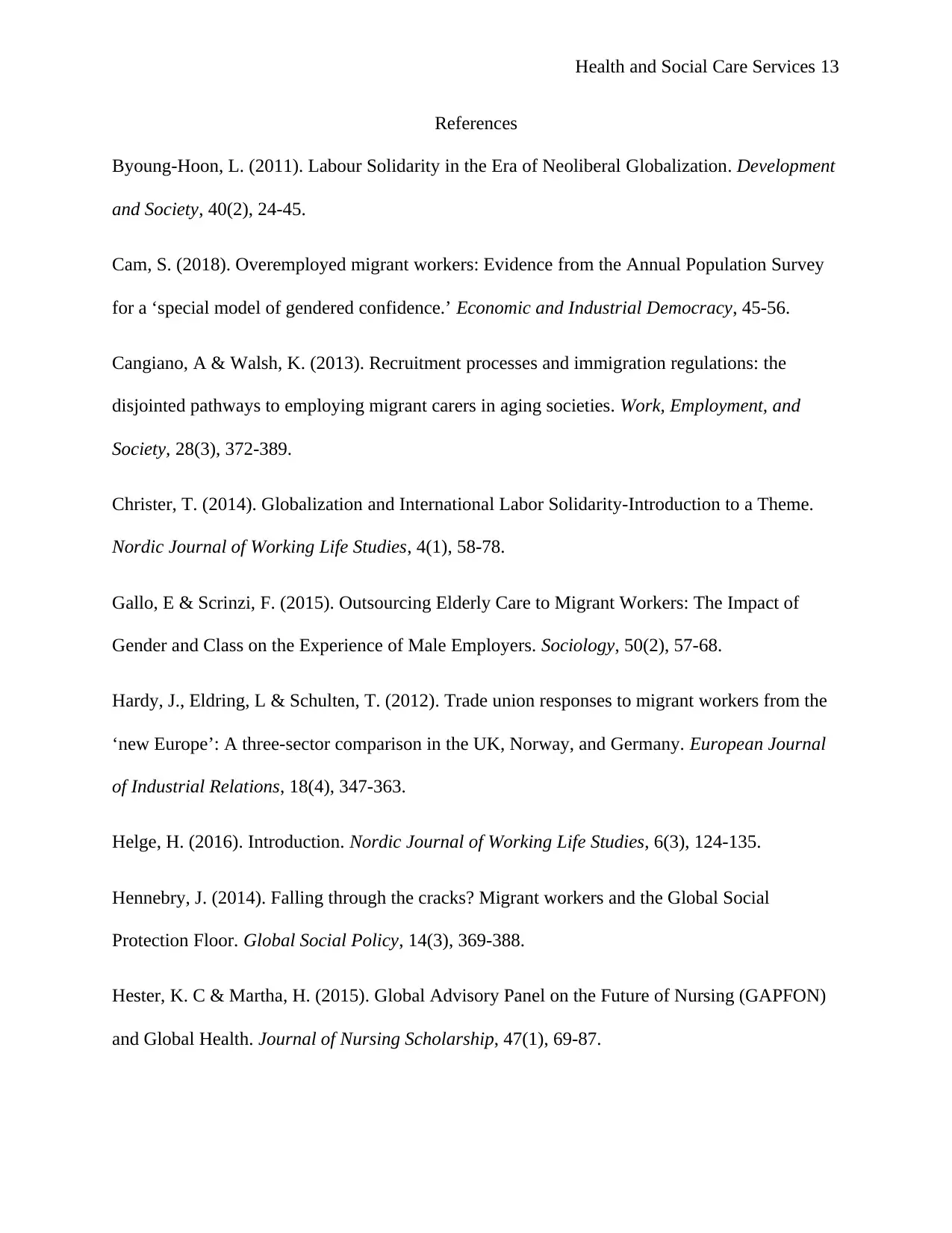
Health and Social Care Services 13
References
Byoung-Hoon, L. (2011). Labour Solidarity in the Era of Neoliberal Globalization. Development
and Society, 40(2), 24-45.
Cam, S. (2018). Overemployed migrant workers: Evidence from the Annual Population Survey
for a ‘special model of gendered confidence.’ Economic and Industrial Democracy, 45-56.
Cangiano, A & Walsh, K. (2013). Recruitment processes and immigration regulations: the
disjointed pathways to employing migrant carers in aging societies. Work, Employment, and
Society, 28(3), 372-389.
Christer, T. (2014). Globalization and International Labor Solidarity-Introduction to a Theme.
Nordic Journal of Working Life Studies, 4(1), 58-78.
Gallo, E & Scrinzi, F. (2015). Outsourcing Elderly Care to Migrant Workers: The Impact of
Gender and Class on the Experience of Male Employers. Sociology, 50(2), 57-68.
Hardy, J., Eldring, L & Schulten, T. (2012). Trade union responses to migrant workers from the
‘new Europe’: A three-sector comparison in the UK, Norway, and Germany. European Journal
of Industrial Relations, 18(4), 347-363.
Helge, H. (2016). Introduction. Nordic Journal of Working Life Studies, 6(3), 124-135.
Hennebry, J. (2014). Falling through the cracks? Migrant workers and the Global Social
Protection Floor. Global Social Policy, 14(3), 369-388.
Hester, K. C & Martha, H. (2015). Global Advisory Panel on the Future of Nursing (GAPFON)
and Global Health. Journal of Nursing Scholarship, 47(1), 69-87.
References
Byoung-Hoon, L. (2011). Labour Solidarity in the Era of Neoliberal Globalization. Development
and Society, 40(2), 24-45.
Cam, S. (2018). Overemployed migrant workers: Evidence from the Annual Population Survey
for a ‘special model of gendered confidence.’ Economic and Industrial Democracy, 45-56.
Cangiano, A & Walsh, K. (2013). Recruitment processes and immigration regulations: the
disjointed pathways to employing migrant carers in aging societies. Work, Employment, and
Society, 28(3), 372-389.
Christer, T. (2014). Globalization and International Labor Solidarity-Introduction to a Theme.
Nordic Journal of Working Life Studies, 4(1), 58-78.
Gallo, E & Scrinzi, F. (2015). Outsourcing Elderly Care to Migrant Workers: The Impact of
Gender and Class on the Experience of Male Employers. Sociology, 50(2), 57-68.
Hardy, J., Eldring, L & Schulten, T. (2012). Trade union responses to migrant workers from the
‘new Europe’: A three-sector comparison in the UK, Norway, and Germany. European Journal
of Industrial Relations, 18(4), 347-363.
Helge, H. (2016). Introduction. Nordic Journal of Working Life Studies, 6(3), 124-135.
Hennebry, J. (2014). Falling through the cracks? Migrant workers and the Global Social
Protection Floor. Global Social Policy, 14(3), 369-388.
Hester, K. C & Martha, H. (2015). Global Advisory Panel on the Future of Nursing (GAPFON)
and Global Health. Journal of Nursing Scholarship, 47(1), 69-87.
Paraphrase This Document
Need a fresh take? Get an instant paraphrase of this document with our AI Paraphraser
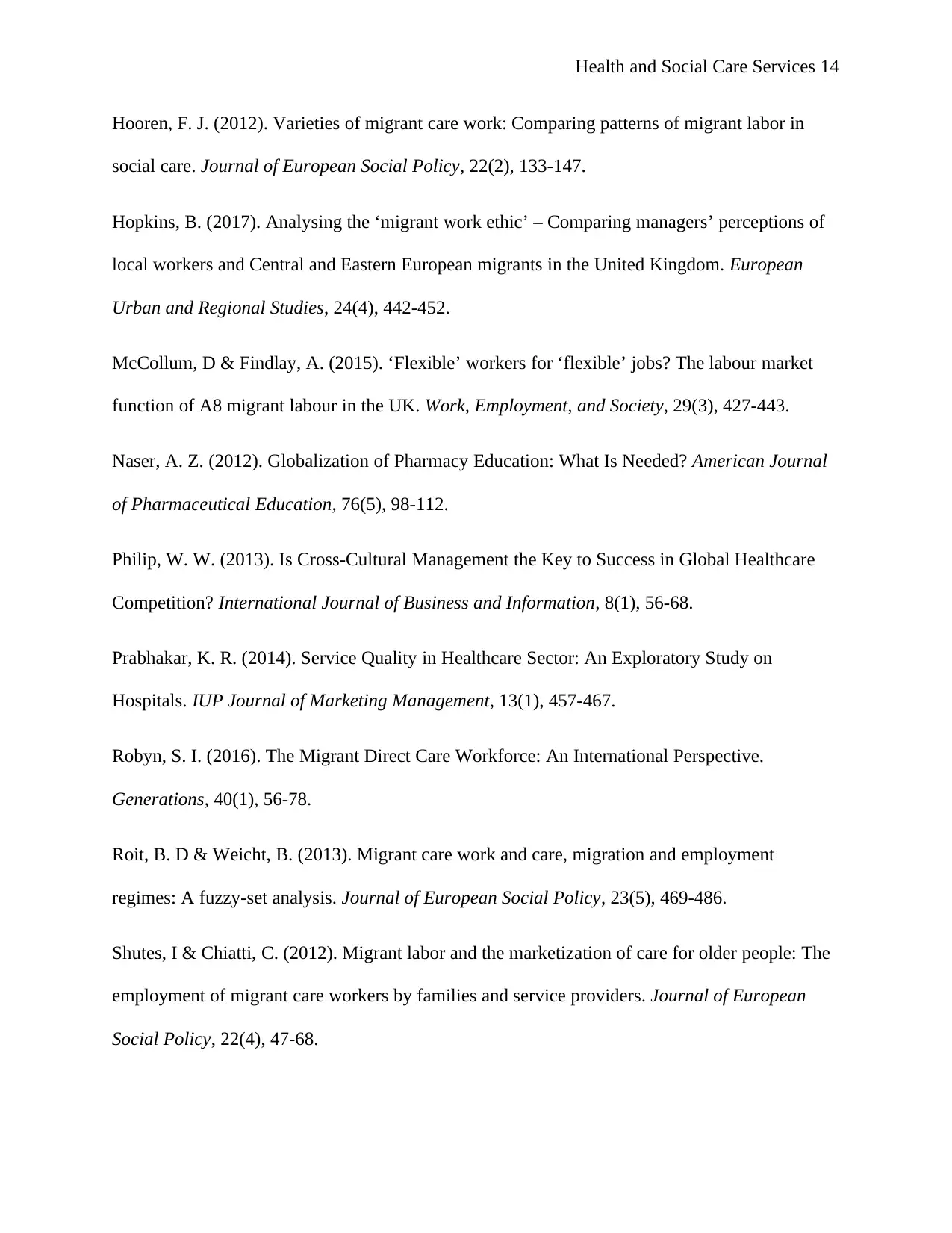
Health and Social Care Services 14
Hooren, F. J. (2012). Varieties of migrant care work: Comparing patterns of migrant labor in
social care. Journal of European Social Policy, 22(2), 133-147.
Hopkins, B. (2017). Analysing the ‘migrant work ethic’ – Comparing managers’ perceptions of
local workers and Central and Eastern European migrants in the United Kingdom. European
Urban and Regional Studies, 24(4), 442-452.
McCollum, D & Findlay, A. (2015). ‘Flexible’ workers for ‘flexible’ jobs? The labour market
function of A8 migrant labour in the UK. Work, Employment, and Society, 29(3), 427-443.
Naser, A. Z. (2012). Globalization of Pharmacy Education: What Is Needed? American Journal
of Pharmaceutical Education, 76(5), 98-112.
Philip, W. W. (2013). Is Cross-Cultural Management the Key to Success in Global Healthcare
Competition? International Journal of Business and Information, 8(1), 56-68.
Prabhakar, K. R. (2014). Service Quality in Healthcare Sector: An Exploratory Study on
Hospitals. IUP Journal of Marketing Management, 13(1), 457-467.
Robyn, S. I. (2016). The Migrant Direct Care Workforce: An International Perspective.
Generations, 40(1), 56-78.
Roit, B. D & Weicht, B. (2013). Migrant care work and care, migration and employment
regimes: A fuzzy-set analysis. Journal of European Social Policy, 23(5), 469-486.
Shutes, I & Chiatti, C. (2012). Migrant labor and the marketization of care for older people: The
employment of migrant care workers by families and service providers. Journal of European
Social Policy, 22(4), 47-68.
Hooren, F. J. (2012). Varieties of migrant care work: Comparing patterns of migrant labor in
social care. Journal of European Social Policy, 22(2), 133-147.
Hopkins, B. (2017). Analysing the ‘migrant work ethic’ – Comparing managers’ perceptions of
local workers and Central and Eastern European migrants in the United Kingdom. European
Urban and Regional Studies, 24(4), 442-452.
McCollum, D & Findlay, A. (2015). ‘Flexible’ workers for ‘flexible’ jobs? The labour market
function of A8 migrant labour in the UK. Work, Employment, and Society, 29(3), 427-443.
Naser, A. Z. (2012). Globalization of Pharmacy Education: What Is Needed? American Journal
of Pharmaceutical Education, 76(5), 98-112.
Philip, W. W. (2013). Is Cross-Cultural Management the Key to Success in Global Healthcare
Competition? International Journal of Business and Information, 8(1), 56-68.
Prabhakar, K. R. (2014). Service Quality in Healthcare Sector: An Exploratory Study on
Hospitals. IUP Journal of Marketing Management, 13(1), 457-467.
Robyn, S. I. (2016). The Migrant Direct Care Workforce: An International Perspective.
Generations, 40(1), 56-78.
Roit, B. D & Weicht, B. (2013). Migrant care work and care, migration and employment
regimes: A fuzzy-set analysis. Journal of European Social Policy, 23(5), 469-486.
Shutes, I & Chiatti, C. (2012). Migrant labor and the marketization of care for older people: The
employment of migrant care workers by families and service providers. Journal of European
Social Policy, 22(4), 47-68.
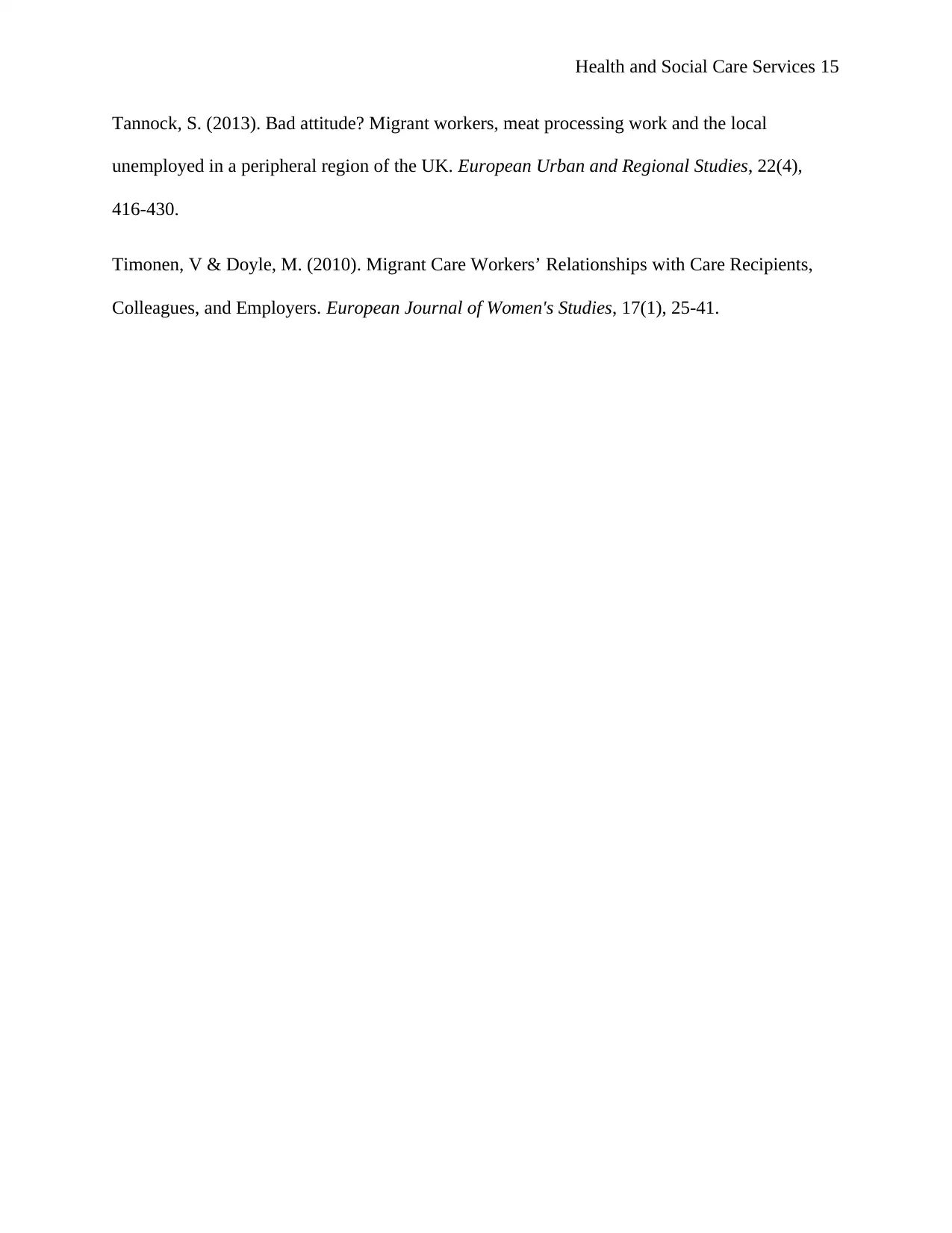
Health and Social Care Services 15
Tannock, S. (2013). Bad attitude? Migrant workers, meat processing work and the local
unemployed in a peripheral region of the UK. European Urban and Regional Studies, 22(4),
416-430.
Timonen, V & Doyle, M. (2010). Migrant Care Workers’ Relationships with Care Recipients,
Colleagues, and Employers. European Journal of Women's Studies, 17(1), 25-41.
Tannock, S. (2013). Bad attitude? Migrant workers, meat processing work and the local
unemployed in a peripheral region of the UK. European Urban and Regional Studies, 22(4),
416-430.
Timonen, V & Doyle, M. (2010). Migrant Care Workers’ Relationships with Care Recipients,
Colleagues, and Employers. European Journal of Women's Studies, 17(1), 25-41.
1 out of 15
Related Documents
Your All-in-One AI-Powered Toolkit for Academic Success.
+13062052269
info@desklib.com
Available 24*7 on WhatsApp / Email
![[object Object]](/_next/static/media/star-bottom.7253800d.svg)
Unlock your academic potential
© 2024 | Zucol Services PVT LTD | All rights reserved.





